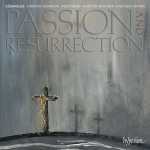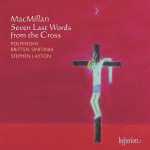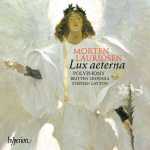
Composer: Paweł Łukaszewski
Performer: Polyphony
Orchestra: Britten Sinfonia
Conductor: Stephen Layton
Format: FLAC (tracks)
Label: Hyperion
Catalogue: CDA67724
Release: 2009
Size: 172 MB
Recovery: +3%
Scan: yes
Via Crucis
01. Introduction: Chorus. Via Crucis
02. Station 1: Jesus Is Condemned to Death
03. Station 1: Universa turba
04. Station 2: Jesus Takes Up the Cross
05. Station 2: Dicebat autem Jesus ad omnes
06. Station 3: Jesus Falls the First Time
07. Station 3: Quis credidit auditui nostro?
08. Station 4: Jesus Meets His Blessed Mother
09. Station 4: Senex Simeon prophetizans
10. Station 5: Simon of Cyrene Helps Jesus Carry the Cross
11. Station 5: Exeuntes autem invenerunt
12. Station 6: Veronica Wipes the Face of Jesus
13. Station 6: Auferet Dominus Deus lacrymam
14. Station 7: Jesus Falls the Second Time
15. Station 7: Vere languores nostros ipse tulit
16. Station 8: The Women of Jerusalem Weep for Jesus
17. Station 8: Sequebatur autem illum multa turba
18. Station 9: Jesus Falls the Third Time
19. Station 9: Omnes nos quasi oves erravimus
20. Station 10: Jesus Is Stripped of His Clothes
21. Station 10: Milites ergo cum crucifixissent eum
22. Station 11: Jesus Is Nailed to the Cross
23. Station 11: Et perducunt illum Golgotha locum
24. Station 12: Jesus Dies on the Cross
25. Station 12: Stabat autem iuxta crucem Jesu mater
26. Station 13: Jesus Is Taken Down from the Cross
27. Station 13: Judaei ergo
28. Station 14: Jesus Is Laid in the Tomb
29. Station 14: Post haec autem rogavit Pilatum Joseph
30. Station 15: The Resurrection
31. Final Chorus. Christus vincit
Stephen Layton’s first disc of Lukaszewski’s choral works (CDA67639, The Choir of Trinity College, Cambridge) was widely praised by listeners entranced by the composer’s unique yet accessible musical language. For this new release Layton and Polyphony, together with the Britten Sinfonia and a team of world-class soloists, have taken on a major work which is destined to become a modern classic in the vein of Taverner’s The Veil of the Temple or Pärt’s St John Passion. Via Crucis is a dramatization of the Stations of the Cross, a musical reading of this most solemn journey that evolves through its 55-minutes in an arc of culminatory ritual power.
Polish composer Pawel Lukaszewski has created a virtual anomaly: a contemporary, large-scale liturgical work that could function equally as well as part of a traditional religious service and as a concert piece with the musical integrity and inspiration to appeal to broad audiences. Lukaszewski, though little known in the West, is clearly a composer to be reckoned with; his wide-ranging imagination and formidable compositional technique have equipped him to write a stunningly dramatic Via Crucis (the Stations of the Cross), traditionally in 14 sections, but here with an added fifteenth station depicting the Resurrection. The rich variety of his choral writing, which draws on traditional polyphony as well as an array of contemporary techniques, allows him to vividly convey the high dramatic profile of the texts. Another striking element is the structural sophistication of his handling of this large-scale text. Some elements, such as a Miserere for women’s voices, are repeated unchanged in every movement. Other elements recur, but in accelerating or broadening tempos as the movement’s progress, and each movement includes a substantial section of new music. Each station is preceded by 1 to 14 thundering hammer strokes, which, despite their predictability, have immense cumulative power. The brilliantly calibrated architecture of the piece makes it easy to follow, and provides an ideal balance between familiar musical material and astonishing new ideas.
The details, too, are beautifully realized and are often stunning in their evocative strength. The choral section of the Ninth Station, “All we like sheep have gone astray,” is a choral haze reminiscent of Ligeti, in which the voices only gradually wander into harmonic coherence. The Eleventh Station, the Crucifixion, has an Orffian propulsiveness and brutality. Jesus’ death, Station Twelve, is accompanied by an orchestra of ocarinas, creating an eerily haunted sound unlike quite anything else in the literature. Stephen Layton leads the vocal ensemble Polyphony, the Britten Sinfonia, and four male soloists in a fabulous performance, raw in its power and awesome in its assurance. Hyperion’s sound is clear, clean, and spacious. Highly recommended.



